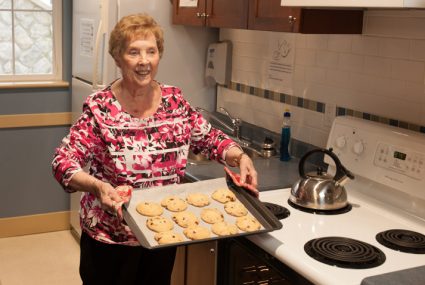As we age, we naturally tend to eat a little less than we used to. Because of this, many seniors cook for themselves much less than they used to, simply because they don’t want to end up with large portions that they just won’t eat. When it comes to seniors with dementia, they often don’t cook at all. While it’s easier for them to have food prepared for them, there are great benefits to be had when they get back into cooking every once in awhile.
Therapeutic Benefits of Cooking for Seniors
Cooking and eating are typically very social experiences for most people. Preparing a meal is a great way to bring friends and family together. This is particularly valuable for seniors with dementia, as the process of cooking and baking can do wonders to elevate their moods. Let’s take a look at some of the many benefits cooking can have on seniors with dementia.
Stimulates the senses
Sight, sound, smell, taste, and touch are senses we likely all take for granted. People with dementia often experience dulling of or loss of some senses. Cooking and baking are fully immersive experiences which engage all the senses. It’s a very tactile activity, which allows them to experience different textures and sensations. It also gets them moving and can improve hand-eye coordination through stirring, kneading dough, and other movements. Familiar sights, sounds, and smells can be incredibly pleasant to encounter, and can be quite relaxing for people.
Brings back memories
As mentioned above, our senses are strongly tied to memory. In particular, smell and taste can bring back very vivid memories. The familiar smells and flavours experienced when cooking a favourite meal can be very therapeutic for seniors with dementia. It’s not just scent and and taste, though. The act of preparing a meal with loved ones can bring back happy memories and drastically improve mood.
When planning what to cook together, think about the things they used to really enjoy making on their own. When you recreate a favourite meal, the scents and sights can trigger happy memories. If they loved to bake, try baking a family favourite bread recipe or a batch of cookies. If cooking is more their speed, find an old family recipe to make together. It’s also a great way to get kids involved and pass down family traditions.
Improves appetite
Many seniors experience a decrease in appetite. It’s a natural part of the aging process, but is important to address. When they are actively involved in preparing a meal, they’ll likely be excited to try it when it’s ready. The delicious aromas can also engage the senses and stimulate appetite.
Encourages socializing
For a lot of people, meals are a very social activity. Many seniors will have fond memories of big family meals enjoyed together, so recreating those times is a wonderful way to bring everyone together. For many seniors, meal times become a bit lonely. When you spend time preparing and enjoying meals together, it encourages them to get involved and connect with everyone. It’s a great way for them to also feel more connected to the food they eat, and it is sure to make mealtime more enjoyable for them.
At Bria Communities, our recreation teams often host events that give residents the opportunity to do some fun, communal food preparation. At Sunridge Gardens, once a month the Breakfast Club prepares a delicious breakfast together and then sits down to eat it together. At The Waterford, our chef does frequent cooking demos (like making fresh pasta) and residents are invited to join in. One of the most frequent comments we hear from our residents is how thankful they are not to have to grocery shop and prepare meals completely on their own anymore, but they very much enjoy having the chance to cook for fun!

Comments